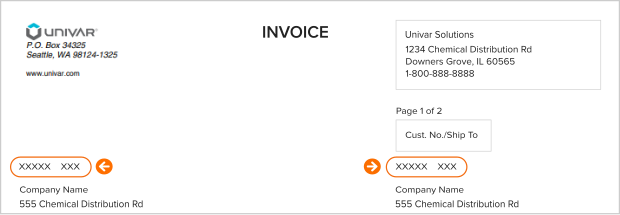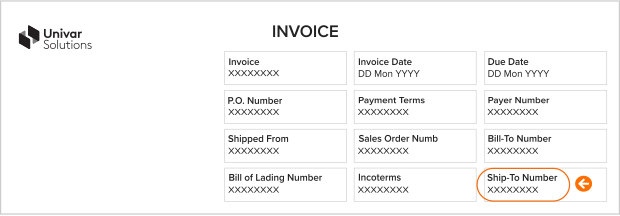We’re here to provide you with more information or help answer any questions you might have. Send us a note and we’ll get back to you as soon as possible.


Sustainability at the product level
Univar Solutions’ Sustainable & Natural Product Framework was developed to help customers evaluate sustainability at the product level. Because there is no global definition of sustainability at the product level, we created a filter that provides evidence of sustainability. This is just the beginning, we know sustainability will continue to evolve and we will communicate changes when the occur.
Here are sustainable & natural product characteristics and their descriptions:


Natural or Bio-based
For both natural and bio-based materials we will follow the ISO 16128-1:2016 Guidelines meaning to meet the mark a material must contain >50% natural or bio-based content. ISO 16128-1 is supplier self-reported and each supplier will warrant that their data is true and correct.Composition statements also support this characteristic.
Bio-based materials are:
- Derived from a biological origin indicating that these can be regrown as a renewable resource
- They may be raw or synthetically processed.
Natural Ingredients are:
- From plant, animal, mineral or microbial ingredients
- Present in or produced by nature
- Produced using minimal physical processing
- Directly extracted using simple methods, simple chemical reactions or resulting from naturally occurring biological processes


Carbon Footprinting
There are many ways to calculate a product’s carbon footprint as this field continues to emerge. ISO 14067 specifies principles, requirements and guidelines for the quantification and reporting of the carbon footprint of a product (CFP), in a manner consistent with International Standards on life cycle assessment (LCA) (ISO 14040 and ISO 14044). At launch, products with evidence, will be included.
The materials must be supplied with a specific supplier claim on the PCF or LCIA through any part of the cradle to grave lifecycle of the product, with cradle to gate being the most commonly reported.
Claim must be accompanied by a figure on the emission per unit of product (likely in Kg or metric tonne of CO2 per unit), KgCO2e or tCO2e/ton product.


Safer Substitutes
Safer Substitutes are materials which offer comparable performance and applications to conventional but with the benefit of reduced environmental and/or health hazards.
For many products, evidence for this characteristic will be achieved through assessment of human health and environmental hazard GHS classification and EU CLP Regulation (SDS section 2) of a conventional material compared with an equivalent material showing lower hazard than the conventional material or other supplier documentation containing this data. If SDS section 2 is general or not clearly comparable, more information will be required.
In the US, OSHA does not require as mandatory information environmental hazard GHS classifications to be included on the SDS. For these US products, comparison evidence will require review of the available Ecotoxicological data to demonstrate that a product is a safer substitute.


Circular Materials
Circular materials are those which support the principles of a circular economy through responsible capture and reuse. Examples include closed loop-solvents and industrial processing materials that have been reprocessed.
The material will be considered circular if after primary use, its recovery and reprocessing result in a new product rather than a waste. This can also apply to the reuse of product or process by-products.
Evidence includes:
Life cycle analysis (LCA) showing process
A statement from the supplier to confirm properties of material stating it’s recycled, reused, recovered or reprocessed nature.


Social Impact Accreditation
These materials are supplied with a specific socially–focused related claim, certification or accreditation from an independent party. The certification/ accreditation may indicate the producer, supplier or product meet certain standards which enable social to be realized in a material’s production.
Evidence of material certification aligned with delivering social value (e.g. fair wages, labor practices and community investment) including, but not limited to materials certified as Roundtable for Sustainable Palm Oil (RSPO), Fair Trade, Rainforest Alliance, UTZ.


Environmental Accreditation
These materials are supplied with a specific socially–focused related claim, certification or accreditation from an independent party. The certification/ accreditation may indicate the producer, supplier or product meet certain standards which enable social to be realized in a material’s production.
Evidence of material certification aligned with delivering social value (e.g. fair wages, labor practices and community investment) including, but not limited to materials certified as Roundtable for Sustainable Palm Oil (RSPO), Fair Trade, Rainforest Alliance, UTZ.
Please note that our suppliers have provided all the data to support each sustainability characteristic and warranted the following:
- All representations regarding Supplier’s compliance with sustainability standards or the sustainability of its individual products (collectively or individually, “Sustainability Representations”) are true and correct in all material regards and shall remain true and correct until updated by Supplier, as required by Section C below.
- All representations regarding Supplier’s Sustainability Representations are fact-based and are not to be considered as mere opinions of the Supplier. Supplier shall reasonably promptly inform Univar in writing of any material changes in fact affecting, or any other bases for modifying, Supplier’s Sustainability Representations.
- Supplier acknowledges that Univar may use the Sustainability Representations from Supplier to convey sustainability information and/or warranties to Univar’s customers. Supplier agrees to (i) waive any claim by Supplier against Univar and (ii) indemnify and hold Univar harmless from any claim, liability or expense (including but not limited to reasonable attorney fees) directly or indirectly arising out of or related to the accuracy of Supplier’s Sustainability Representations provided to Univar’s customers.
- These obligations supplement the duties and obligations of any existing agreement(s) between Univar and Supplier.
Our Suppliers also sign our Supplier Code of Conduct (ideal for this to be a link to governance part of website) so you can be assured that we are working throughout our supply chain to transparently create our Sustainable & Natural Products Portfolio.




